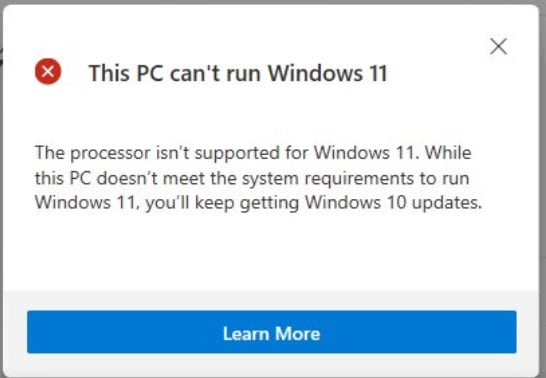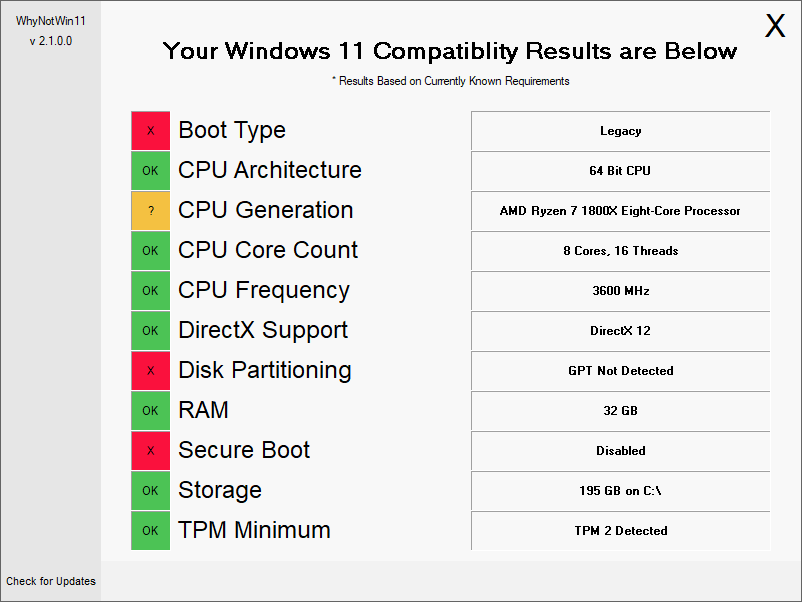An open-source application called WhyNotWin11 acts as a better drop-in replacement for Microsoft's PC Health Check app to determine if your hardware is compatible with Windows 11.
This week, Microsoft announced that the next version of Windows is Windows 11 would be the next version of Windows and that it would be released as a free upgrade this fall.
As part of this announcement, Microsoft also published Windows 11's minimum hardware requirements needed to upgrade or install Windows 11.
Microsoft released the PC Health Check app to check your computer's hardware and tell you if it is compatible with Windows 11.
Unfortunately, Microsoft's first version of the PC Health Check app did not tell users what hardware was failing tests, leading to even more confusion.
For many people, the issue was that they did not have a required TPM 2 compatible security processor enabled on their computer. As a result, Microsoft released an updated PC Health Check app that specifically warned users that a TPM 2 device was missing.
Unfortunately, the PC Health Check app is not as informative when other failed tests.
For example, the message below is pretty useless, and a CPU may still be considered incompatible even though it meets the requirements in terms of CPU cores and speed.
|
|
 |
WhyNotWin11 fills in the gaps
This lack of information is where a new open-source tool named WhyNotWin11 shines, as it provides a far greater amount of detail, letting you know exactly what hardware is incompatible.
Instead of just giving vague responses like the PC Health Check tool, WhyNotWin11 will list each requirement and show where your computer's hardware is lacking.

As you can see from the results above, WhyNotWin11 gives detailed information about what particular hardware category is failing so that you can resolve it with new hardware or by enabling settings on your motherboard.
This is especially useful for CPUs, where PC Health Check states a CPU is not compatible even though it meets the required processor speed and number of cores.
Microsoft may have marked this as incompatible because it does not have a built-in TPM 2 processor. However, users can install a dedicated TPM processor on their motherboard to resolve that missing piece, thus making all hardware compatible.
Having all of this information at their fingertips allows users to determine for sure what hardware is failing so that they can work around it and still install Windows 11.
It should also be noted that even though your hardware may not be 100% compatible, it is likely not going to prevent Windows 11 from installing on your device as long as most of your hardware is compatible.
The nice thing about WhyNotWin11 is that it is an open-source AutoIt script, so you can see exactly what the program is looking for to run your own tests from the command line.
You can download a precompiled WhyNotWin11 executable from GitHub or build your executable from the source code.
H/T Deskmodder.de



Comments
davidil28 - 3 years ago
An open source soft does a better job than windows, stop the press xD. Shocking, right?
JohnC_21 - 3 years ago
I also get a question mark on CPU generation so I guess what CPUs are supported is still up in the air until confirmed by Microsoft.
PatL - 3 years ago
Hybrid Analysis says that the file is malicious https://hybrid-analysis.com/sample/03ad9794200346d393ff1e14ece895ac8184a1fa179cc13561b3fdfe7a2df6d1. Just putting that out there. My machine passed everything though, so yay, I guess...
GT500 - 3 years ago
I think that's just a byproduct of the way it works. I haven't verified this, but from a quick skim of the analysis it sounds like it may be launching command-line tools in the background to get the info it needs.
PatL - 3 years ago
Unfortunately it seems like it may be background malicious, now that Win Defender is straight up blocking it. OH well, here's to fun lil software right?
TanyaC - 3 years ago
Tells me My Samsung 970 Evo Plus 2TB boot drive is not GPT. Looking at the properties of the drive it says the drive is GPT... Guess they still have some work to do on the program.
Wolverine 7 - 3 years ago
WhyNotWin11?,..well..,because its a work in progress,like10 was to start with,..its bloated,more a "device",than a computer,and the gui looks like it was designed for Millenials,and 12 yrs old girls,..which it probably was,..most people who "upgrade",from ten wont like it,..serious gamers,..shoppers,..sure,.otherwise,..forget it for at least a year,..
You have been warned..;-)
grimson - 3 years ago
Trojan:Win32/Wacatac.B!ml
Flagged by Windows Defender
https://github.com/rcmaehl/WhyNotWin11/releases/download/2.2.2/WhyNotWin11_x86.exe
saluqi - 3 years ago
MS Defender prevented the download/install of WhyNotWin11 2.2.4 on my desktop computer. Absolute block, doesn't seem to be any way around it. Says it is malicious code.
The MS health check said my desktop is not UEFI -- well, I already knew that, will have to update to a GPT/UEFI system, I believe that can be done, but the MS health check gave no further information. The CPU in my Dell XPS 8700 desktop is Intel Core i7 4790, which is not on the list of Win 11 compatible processors???? The 4790 has 4 cores @ 3.6 GHz??
noelprg4 - 2 years ago
but your Intel i7 4790 cpu is 4th generation Intel (hence 4 in the 1st number)
you need i7-8xxx cpu (8th gen Intel) or newer to try out Win11
midimusicman79 - 3 years ago
You can refer to this Windows Deployment | Microsoft Docs article on How to use the MBR2GPT tool to convert from MBR to GPT:
https://docs.microsoft.com/en-us/windows/deployment/mbr-to-gpt
Good luck! :-)
Guenter_Born - 3 years ago
The tool is rather helpful, but there are side effects, you should know.
While it has been mentioned, that Virustotal flags the tool as malicious (false positive), we should also note, the the tool comes with a DLL hijacking vulnerarbility.
So my recommendation is: It should be used with extreme care, to mitiagate the risk. Some advices may be found at the articles end linked below:
https://borncity.com/win/2021/06/26/windows-11-kompatibilittstests/
saluqi - 2 years ago
Re: CPU generation, both of mine are 4th generation, I know. AFAIK they weren't listed for Windows 10 either, and they have been running Win 10 just fine ever since it came out. There are so many loose ends here I'll just wait a while and see what falls out <G>.
@Günter Born -- which tool are we talking about here? The compatibility tests? Not, I hope, the conversion MBR to GPT. For compatibility testing, I'd like to wait for the dust to settle.